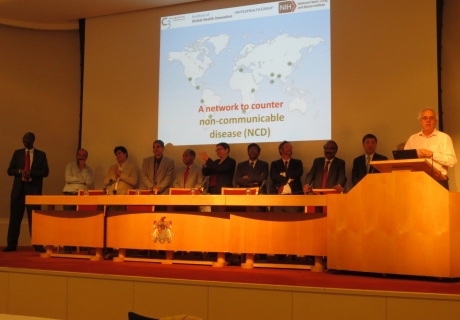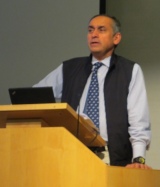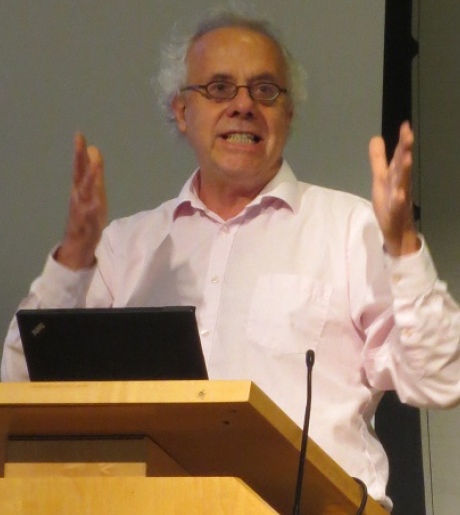Health leaders gather to combat non-communicable diseases
by Jo Seed

Guests assembled at the Royal Society last week to hear about efforts to tackle non-communicable diseases (NCD) in low and middle income countries
NCD includes cardiovascular disease, diabetes, chronic obstructive pulmonary disease (COPD), and common cancers. These conditions are caused by tobacco use, poor diet, physical inactivity, and the harmful use of alcohol.
NCD accounts for over 60 per cent of deaths worldwide with 80 per cent in low & middle income countries, but only about 3% of current global health aid is devoted to its prevention and management. Without concerted action, deaths are projected to increase to 41 million a year by 2015, and almost half of those deaths will be in people under 70.
The poorest people have the highest death rates. Ischaemic heart disease, stroke, other cardiovascular disease, COPD, and depression are all predicted to be in the top ten causes of lost DALYs (disability adjusted life years - a measure of overall disease burden, expressed as the number of years lost due to ill-health, disability or early death.) by 2030.
 Last Friday, IGHI, C3 Collaborating for Health and the UnitedHealth Chronic Disease Initiative hosted a special half day event at the Royal Society in London to present the findings of 11 low and middle income countries working on combatting NCD.
Last Friday, IGHI, C3 Collaborating for Health and the UnitedHealth Chronic Disease Initiative hosted a special half day event at the Royal Society in London to present the findings of 11 low and middle income countries working on combatting NCD.
Despite the high burden in low and middle income countries, research aimed at reducing NCD is limited and there is an urgent need to increase studies in these countries. C3 and the Chronic Disease Initiative believe that the research needs to be aimed particularly at policy, surveillance and operational research to identify low cost solutions. The network of 11 centres comprises 120 institutions and they have been conducting this kind of research and building capacity for five years.
NCD need not be expensive and can be mounted at a cost of $1 per person per year in low income countries
– Professor Richard Smith
UnitedHealth Chronic Disease Initiative
The Centres come from China, Bangladesh, India (2), Tunisia, Kenya, South Africa, Mexico, Central America, Peru, and the Southern Cone (Argentina, Uruguay and Chile). Between them, they have conducted some 100 studies, including around 15 randomised trials.
These studies were discussed in detail at the meeting and health leaders working on NCD were also invited to a networking lunch after the event in order to discuss and flesh out the issues further.
The discussion was widened by inviting guests following the event through Twitter to join the debate via a live Twitter feed using the hashtag #PreventNCD.
 Professor the Lord Ara Darzi, Director of IGHI and speaker at the meeting said: “Research is crucial in reducing the suffering, premature mortality, and economic loss caused by NCD, just as it has been in countering communicable or infectious disease. The work of the 11 centres is an important first step towards combatting and preventing the burden of NCD both for the developed and the developing world”.
Professor the Lord Ara Darzi, Director of IGHI and speaker at the meeting said: “Research is crucial in reducing the suffering, premature mortality, and economic loss caused by NCD, just as it has been in countering communicable or infectious disease. The work of the 11 centres is an important first step towards combatting and preventing the burden of NCD both for the developed and the developing world”.
Professor Richard Smith of the UnitedHealth  Chronic Disease Initiative and Adjunct Professor at IGHI said: “WHO has calculated that a programme to counter NCD need not be expensive and can be mounted at a cost of $1 per person per year in low income countries, $11.4 billion/year for all countries, amounting to $170 billion from 2011 to 2025. It is imperative therefore that we act now in order to deter the coming storm.”
Chronic Disease Initiative and Adjunct Professor at IGHI said: “WHO has calculated that a programme to counter NCD need not be expensive and can be mounted at a cost of $1 per person per year in low income countries, $11.4 billion/year for all countries, amounting to $170 billion from 2011 to 2025. It is imperative therefore that we act now in order to deter the coming storm.”
Further information
- Download the Powerpoint presentation of the event
- Watch a short video about the initiative
- Download the brochure about the initiative
- Find out more about the speakers at the event and read their biographies
Media Coverage
- British Medical Journal - I’m the minister of health in a poor country
- The Lancet - A global research network for non-communicable diseases
- IGHI blog - Moving from global health 3.0 to global health 4.0
Article text (excluding photos or graphics) © Imperial College London.
Photos and graphics subject to third party copyright used with permission or © Imperial College London.
Reporter
Jo Seed
Institute of Global Health Innovation